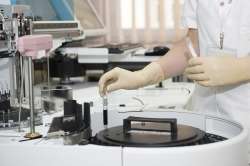Scientists develop human intestinal lining on chip
The intestine chip may help doctors to test various drug options on the chip, without putting patients through drug treatments that may be costly.

In a breakthrough, scientists have successfully replicated a human intestinal lining using patient-derived cells inside an organ-chip, a finding that has potential to advance personalised treatments for gastrointestinal diseases.
The Intestine-Chip, made out of a flexible polymer that features tiny channels that can be lined with thousands of living human cells, may help doctors to test various drug options on the chip, without putting patients through drug treatments that may be costly, ineffective or carry harmful side effects. The chip also stores a patient's stem cells, meaning it can be used to test a drug's effectiveness instead of the patient going through the tests.
"This pairing of biology and engineering allows us to re-create an intestinal lining that matches that of a patient with a specific intestinal disease-without performing invasive surgery to obtain a tissue sample," said co-author Clive Svendsen, from the Cedars-Sinai Board of Governors Regenerative Medicine Institute. "We can produce an unlimited number of copies of this tissue and use them to evaluate potential therapies. This is an important advance in personalised medicine," he added, in a paper published in the journal Cellular and Molecular Gastroenterology and Hepatology.
To produce and sustain the intestinal lining, the team collaborated with Emulate, a US-based biotech start-up, and collected samples of blood and skin cells from adults and reprogrammed into pluripotent stem cells. The team then used "special proteins and other substances", to morph the cells into intestinal lining cells.
Each cell was an exact mirror of the genetic fingerprint of the person that had donated it. The new cells were used to grow miniature versions of the person's intestine lining, known as organoids.They then selected cells from these organoids and placed them inside the Intestine-Chips, which are about the size of AA batteries and re-created the natural microenvironment of the human intestine, including the intestinal epithelium.
Injecting fluid into the chips caused them to develop and grow. Tests showed that it was identical genetically to the original donor.
For all news and updates, stay tuned to our Facebook page